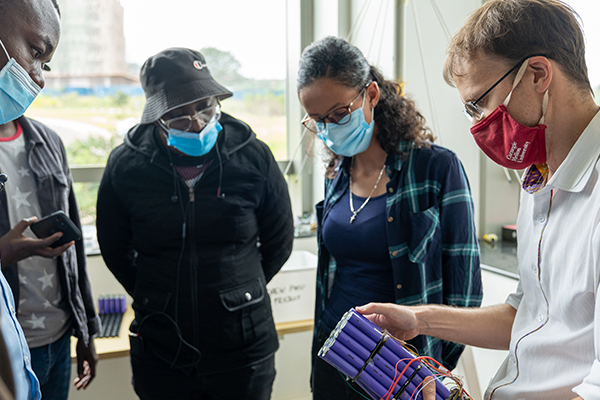Solving Africa’s energy crisis one battery at a time
Hope Reveche
Feb 8, 2023
The need for low-cost energy has been a challenge that Africa has been facing for many years as the continent moves toward a more digital future. This demand for cheaper and more accessible energy across the continent has spurred research initiatives such as those at CMU-Africa. Barry Rawn, an associate teaching professor of electrical and computer engineering, has joined forces with collaborators at CMU’s Pittsburgh campus, including Jay Whitacre, trustee professor in energy. Rawn and his colleagues are working to achieve affordable energy storage for consumers while also reducing the environmental effects of e-waste. Their goal is to increase the available quantity of energy storage and introduce energy storage devices onto the market at a more affordable price.
Rawn, along with students working on the project, saw the potential value in repurposing used battery cells from solar energy systems and electric vehicles and began approaching e-waste recycling companies that could partner in the endeavor. Rawn and David Ross of the Industry Innovation Laboratory (IIL) at CMU-Africa co-developed winning applications with the recyclers Enviroserve Rwanda and Hinckley Nigeria. They were then awarded the international industrial research grant Global LEAP, which supports sustainable e-waste management solutions. Rawn and visiting professor Sarath Tennakoon then worked to enhance the infrastructure needed to study battery characterization as well as create two year-long jobs for CMU-Africa students.
With more people working on this project, one key research problem that Rawn and his colleagues are trying to navigate is the issue of safety. "It's especially the end user, but you also have to keep the people doing the work safe," he emphasizes. "To avoid consumer accidents, we have to make sure we communicate well and have really high standards for battery safety."
Battery management systems are another important component that Rawn and his team are studying. He adds that "part of repurposing e-waste is sometimes bringing the control systems back to life," explaining why they began exploring the management systems of these buses in addition to taking apart the energy storage cells for reuse. By figuring out how to communicate with battery management boards, these researchers are able to build safe energy storage systems from the bus modules without disassembly and manage them more easily.

Source: CMU-Africa
Rawn discussing battery management with students at CMU-Africa
This research also has the potential to have an important economic impact on the continent. By creating new uses for these batteries, jobs can be created in each step of the repurposing process. "There are jobs associated with making the second-life products, jobs associated with managing that fleet of batteries, and jobs associated with disassembling electric vehicle batteries and safely storing and grading them for use in their next life," Rawn says.
The collaboration between CMU-Africa and its Pittsburgh counterpart has even led to the creation of a startup called Second Life Storage (SLS), founded by three CMU Engineering alumni. Based in Kigali, the company markets energy storage-as-a-service using repurposed batteries.
A future challenge in this research may include the acquisition of these batteries. Currently, recycling companies are the ones being paid to take unwanted dead batteries off the hands of companies who are done using them. But with more research being done on battery repurposing, the batteries are being viewed more as a "product" as opposed to waste, and the question of who should really be paying arises.